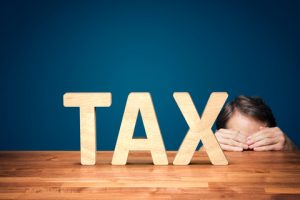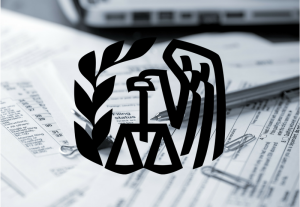 Received an IRS Bitcoin Letter? The IRS recently sent out approximately 10,000 letters across the US to those who have sold Bitcoin or other cryptocurrency (i.e., LiteCoin, Ethereum, etc.) in the past. These letters signal the IRS’ intentions to increase enforcement of unreported Bitcoin and other cryptocurrency transactions as they stand to gain additional revenue through increased taxes, interest, and penalties to be assessed. This action may not come as a surprise given the manic level of trading and publicity cryptocurrency has garnered at times since 2017 when Bitcoin hit its all-time high. It was also only a matter of time before the IRS stepped up enforcement efforts after it succeeded in its lawsuit against Coinbase, a cryptocurrency exchange, to turn over user data. The question now is what to do about an IRS Bitcoin letter?
Received an IRS Bitcoin Letter? The IRS recently sent out approximately 10,000 letters across the US to those who have sold Bitcoin or other cryptocurrency (i.e., LiteCoin, Ethereum, etc.) in the past. These letters signal the IRS’ intentions to increase enforcement of unreported Bitcoin and other cryptocurrency transactions as they stand to gain additional revenue through increased taxes, interest, and penalties to be assessed. This action may not come as a surprise given the manic level of trading and publicity cryptocurrency has garnered at times since 2017 when Bitcoin hit its all-time high. It was also only a matter of time before the IRS stepped up enforcement efforts after it succeeded in its lawsuit against Coinbase, a cryptocurrency exchange, to turn over user data. The question now is what to do about an IRS Bitcoin letter?
What to do About an IRS Bitcoin Letter?
The answer is to respond to the IRS Bitcoin letter as ignoring notices from the IRS is never advised. The IRS has the ability to make assessments against those people who don’t respond. Further ignoring those assessments can result in wage garnishment, banking account levies, tax liens, etc. Not to mention, the North Carolina Department of Revenue (NCDOR) will likely be following shortly behind to collect its share of unreported Bitcoin and other cryptocurrency income based on the adjustment made by the IRS. In some case, the IRS may even pursue criminal charges as “virtual currency is an ongoing focus area for IRS Criminal Investigations” per Notice IR-2019-132 issued July 26, 2019. As such, an IRS Bitcoin letter should be taken seriously.
How to Report Bitcoin on a Tax Return
To be fair, the IRS has not exactly provided much guidance on the issue since the issuance of IRS Notice 2014-21 despite multiple requests from taxpayer and tax professionals alike. To add more confusion, such guidance seemingly conflicts with the information requested on the IRS Bitcoin letters recently issued. The key take away is that the IRS considers Bitcoin and other cryptocurrencies to be property similar to stocks (and not a fiat currency like the US dollar, Mexican Peso, etc.). As such, the value of the property needs to be calculated for each Bitcoin transaction or trade. The IRS recommends that taxpayers file amended tax returns to proactively report their Bitcoin gains and losses before they get around to doing it for taxpayers (usually not to their advantage). More specific detail pertaining to the the IRS Bitcoin letters can be found directly on the IRS website.
How to Calculate Bitcoin Gains and Losses
For most people, the starting point of calculating any gains or losses from the sale of Bitcoin or other cryptocurrencies is to calculate how much cash (in US dollars) was deposited into their Coinbase or other exchange (i.e., Binance, etc.) account plus additional fees incurred (i.e., bank “crypto” fees, etc.) before the first trade or transaction was made. Then this amount is divided by the number of full and partial units of cryptocurrency purchased. This produces the the initial price per unit. If up until this point a person has done nothing else but let the units sit in the exchange or in a personal e-wallet or in a cold storage “hard wallet” (i.e., Ledger Nano) then its likely they have no reportable or taxable transactions. However, the moment a subsequent trade or purchase is made the person enters into the world of reportable and likely taxable transactions. For each transaction one must recalculate the value per unit before the transaction to determine the gain or loss after the transaction. It doesn’t matter if a person ends up losing more money than ever gained; each transaction must still be reported. As if this all wasn’t tricky enough on its own, many people used cryptocurrencies to buy other cryptocurrencies or “Alt Coins”(i.e., Tron).
How to Calculate the Value of Alt Coins?
As an overview, Alt Coins are essentially virtual currency purchased with other virtual currency instead of fiat (cash). This is analogous to buying 5 apple for $5 ($1 per apple) and then trading 4 apples for 2 oranges. What then is the value of the oranges? The orange would be worth $2 each. Let’s say that you then you sold both oranges for a total of $1. What would be the gains or losses reported on IRS tax returns for these transactions? I won’t belabor the point further, but know that these are the types of issues that significantly increase the complexities regarding the reporting of Bitcoin and other cryptocurrencies and Alt Coins to the IRS on tax returns.
How Do I Find the Value of my Bitcoin or Alt Coin From the Past?
There are many sites that can be found upon a quick Google search that will report the value of Bitcoin’s high, low, and average price for a certain day in the past. However, it appears the IRS is now currently demanding the specific value at the point in time a transaction was made converted to US dollars. A lot of this historic information can be found by logging into the exchange used to transact the Bitcoin and other cryptocurrency and to run through the calculation steps provided above. However, many exchanges such as Coinbase and Binance have different versions of their user interfaces that vary in detail provided and complexity in understanding data outputs. Luckily, it does appear that the exchanges are making strides to summarize data for users; however, it still has major limitations in its actual usefulness when preparing returns.
In closing, the sale of Bitcoin and other cryptocurrencies, similar to stocks, are considered property and not cash. Therefore, in general, the exchange of cryptocurrency will trigger an event that is reportable for tax purposes which may result in a gain or loss. In either case, these transactions must be reported on annual tax returns to the IRS and states (i.e., NCDOR). The recent increased enforcement of cryptocurrency by the IRS appears to be just the tip of the iceberg as cryptocurrency seems here to stay. As such, it’s best to proactively report the cryptocurrency transactions in a timely manner as accurately as possible and to respond to an IRS Bitcoin letter, if received.
About the Author:
Lauren Massie, CPA, EA, MBA resides in Raleigh, North Carolina. The primary focus of her CPA practice is income tax representation for individuals who need tax help with the IRS or the North Carolina Department of Revenue. She regularly assists clients with issues such as tax liens, unfiled tax returns, back taxes, wage garnishments, bank levies, installment agreements, and the filing of an Offer in Compromise to settle tax debts. Have questions? Lauren can be reached directly at (919) 792-8511 or through this link.
I’m here to help!
Lauren Massie
Lauren Massie, CPA, PLLC
8480 Honeycutt Road, Suite 200
Raleigh, NC 27615
(919) 792-8511
Lauren Massie, CPA, PLLC is based in Raleigh, North Carolina and serves clients throughout the Greater Triangle Area including cities such as Wake Forest, Durham, Cary, Chapel Hill, Morrisville, Holly Springs, Fuquay-Varina, Clayton, Louisburg, Knightdale, Zebulon, Rolesville, Wendell, Hillsborough, Youngsville, Franklinton, Garner, Zebulon, Henderson, Franklinton, Holly Springs, Creedmoor, and Angier.









 Have unpaid tax debts or unfiled back taxes and looking for a fresh start? If so, I can help! Over the past 12+ years I’ve helped many clients from Raleigh, North Carolina and the Greater Triangle area to resolve their tax debt issues with the Internal Revenue Service (IRS) and the North Carolina Department of Revenue (NCDOR). Below is a brief overview of tax resolution services that I offer to help people settle tax debts.
Have unpaid tax debts or unfiled back taxes and looking for a fresh start? If so, I can help! Over the past 12+ years I’ve helped many clients from Raleigh, North Carolina and the Greater Triangle area to resolve their tax debt issues with the Internal Revenue Service (IRS) and the North Carolina Department of Revenue (NCDOR). Below is a brief overview of tax resolution services that I offer to help people settle tax debts.